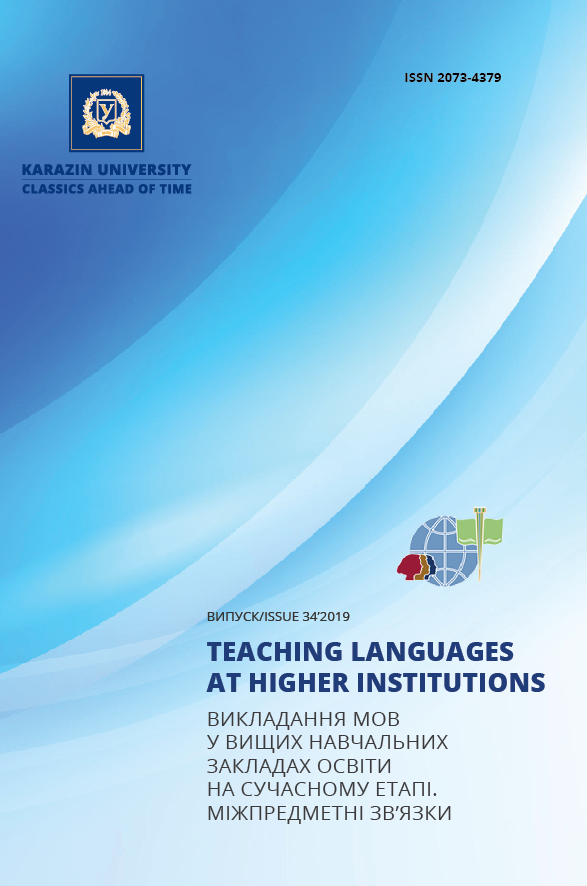Teacher’s professional linguocommunicative competence in the context of intercultural communication
Abstract
Linguistic-communicative component of the professional competence of a teacher, who trains Russian for English speaking students-non-philologists at level A 2, have been investigated in the article. In particular, oral speech genre as a stable statement is in the center of attention (by M. Bahtin).One of the more frequency type of genre, which is used in the teacher’s monologues at the lessons – estimating (by T. Shmelyova classification), and one of the genre elements of any speech genre – it’s personification, which is represented in our study by lexical means, using by the teacher for estimating inophones’ class work, have been selected for our research. The results of questioning the teachers, concerning the use of the oral lexical estimating means during the class work in the context of intercultural communication, have been fixed, systematized and analyzed by the author. 54 lexical units of positive and negative estimating of the student’s work in Russian, English as well as in mediator language and some lexemes in 7 languages, more useful in the groups, have been examined. Levels word-word combination – sentence have been singled out and analysis of efficiency of using the concrete lexemes at estimating inophonesʼ work, considering their preparation to understand teacher’s intensions, and their conformity with the demands of intercultural communication have been suggested. Lexemes, successfully chosen by the teacher, as well as lexemes, which don’t promote efficiency of intercultural communication, complicate the process of training inophones, have been marked. The causes of unsuccessful using of the analyzed linguistic means and ways of increasing the estimation efficiency as a type of the statement have been named.
Downloads
References
Bahtin, M.M. (1996). Problema rechevyh zhanrov [The problem of speech genres]. Sobranie sochinenij. T. 5: Raboty 1940–1960 gg. [Collected Works. Vol. 5: Works 1940–1960]. Moscow: Russkie slovari, pp. 159–206 [in Russian].
Kuplevatska, L.O. and Manivska, T.Ye. (2016). Osoblyvosti linhvokulturnoi adaptatsii indiiskykh studentiv u vyschykh navchalnykh zakladakh Ukrainy v konteksti mizhkulturnoi komunikatsii [Features of Linguistic and Cultural Adaptation of Indian Students in Higher Educational Institutions of Ukraine in the Context of Intercultural Communication]. Vykladannia mov u vyschykh navchalnykh zakladakh osvity na suchasnomu etapi. Mizhpredmetni zviazky [Teaching languages at higher educational institutions at the present stage. Interpersonal relationships]. Kharkiv: V.N. Karazin Kharkiv National University, 29, pp. 55–69 [in Ukrainian].
Lest' kak manipuljativnoe sredstvo [Flattering as a manipulative tool]. (2016). Available at: https://lib.rosdiplom.ru/library/prosmotr.aspx?id=495902 [Accessed April 10, 2019] [in Russian].
Oberg, R. (1960). Culture shock: Adjustment to new cultural environments. Practical Antropology. 1960, Vol. 7 [in English].
Rechevyie zhanryi i napravleniya ih izucheniya. Vidyi rechevyih zhanrov. Anketa rechevogo zhanra. Etiketnyie rechevyie zhanryi [Speech genres and directions of their study. Types of speech genres. Questionnaire of speech genre. Label speech genres] [online]. Available at: http://linguistics-konspect.org/?content=9264 [Accessed April 11, 2019] [in Russian].
Semeniuk, O.A. and Parashchuk, V.Iu. (2010). Osnovni vydy komunikatsii [Basic types of communication]. Osnovy teorii movnoi komunikatsii. [Fundamentals of linguistic communication]. Kyiv: Akademvydav, pp. 39–43 [in Ukrainian].
Sternin, I.A. (2015). Modeli opisanija komunikativnogo povedenija. [Models of the description of communicative behavior]. Voronezh: Grant [in Russian].
Tepla, O.M. (2010). Formuvannja mіzhkul'turnoї komunіkacії u procesі navchannja іnozemnih studentіv ukraїns'koї movi [Formation of intercultural communication in the process of teaching foreign students of the Ukrainian language]. Komparativnі doslіdzhennja slov’jans'kih mov і lіteratur [Comparative studies of Slavic languages and literatures]. Kyiv, 12, pp. 179–182 [in Ukrainian].

